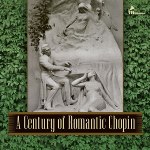The broad range of pianists selected for this remarkable anthology (astutely and intelligently curated by Gregor Benko and Ward Marston) are represented by performances recorded between 1895 and 2003, almost all of which strike a delicate balance in regard to freedom, taste, proportion, and classicism. More importantly, each artist makes Chopin come alive.
Ignaz Friedman’s celebrated 1936 E-flat Nocturne Op. 55 No. 2 is the ultimate case in point, but the same holds true of Marcel Ciampi’s less known yet grippingly sustained Op. 48 No. 1 C minor Nocturne. I first listened through the four discs without identifying the pianists, and when I learned who they were I often was surprised. Few of Earl Wild’s studio Chopin efforts come close to the live G minor Ballade here–so outlandish, yet so inevitable, octave doublings and all. That delightfully fleet Op. 30 No. 4 C-sharp minor Mazurka, with a color change on every beat, belongs to the late, undervalued Joseph Villa. I swore that the amazingly fast and fiercely authoritative C-sharp minor Op. 10 No. 4 Etude was Sviatoslav Richter in his prime–but no, it’s Sidney Foster.
An Op. 25 No. 5 Etude with hot liquid cantabiles and rubatos that stretch out to high heaven yet never snap? The young Geza Anda. An impetuous, unbuttoned C-sharp minor Scherzo? None other than Karl Ulrich Schnabel. And who would have credited this sensitive, texturally three-dimensional C-sharp minor Op. 25 No. 7 Etude to conductor Evgeny Svetlanov in one of his rare recorded keyboard outings?
Jorge Bolet’s blazing live 1972 Fourth Ballade leaves his logy Decca studio version in the dust, while a few wrong notes don’t matter at all when the 87-year-old Arthur Rubinstein plays the F major Op. 25 No. 3 Etude with more poetry and character than anyone else (listen to how easily he tosses off the final upward run, and slightly slows down to place the last few notes–what a sense of timing!).
We expect Friedman’s rollicking, slightly madcap A-flat Polonaise to be full of textual add-ons, but not the normally cool and patrician Solomon to transpose a couple of the A major “Military” Polonaise’s left-hand chords down an octave. Those who buy Harold C. Schonberg’s damning assessment of Vladimir de Pachmann need to know his best recordings, such as this very straightforward and rather forceful rendition of the E minor Op. 72 No. 1 Nocturne, recorded in 1927 when the pianist was nearly 80. And there’s nothing remotely erratic or sloppy concerning Paderewski’s crystalline, gorgeously nuanced A minor Mazurka Op. 17 No. 4. I’d also apply this praise to an unpublished test pressing featuring Arthur Loesser in the A-flat Waltz Op. 42.
Listeners, of course, will discover their own surprises, as well as reconnect with old favorites in properly pitched, newly minted transfers. Buy this release while you can, and hope that Ward Marston and associates have something equally special in store for Liszt’s 200th birthday year in 2011. [9/23/2010]
































